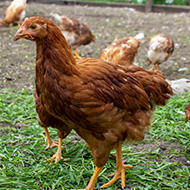Wales introduces new avian flu measures

"I want to thank all keepers for the steps they have taken to keep birds in Wales safe from this devastating disease" - Dr Gavin Watkins.
The Welsh government has announced new compulsory biosecurity and housing measures for poultry and captive birds in Wales, following surveillance suggesting a heightened risk of avian influenza in the country over winter.
Dr Gavin Watkins, interim chief veterinary officer for Wales, said that the steps were being taken now in order to get ahead of of the potential increased level of avian flu in the environment.
Coming into force across Wales on Friday 2 December, the new measures introduce a legal requirement for all bird keepers to keep their birds indoors or otherwise separated from wild birds.
Alongside this, keepers will also be required to complete and act upon a bespoke biosecurity review of the premises where birds are kept in order to minimise the risk of virus entry in bird houses.
The Wales Avian Influenza Prevention Zone also remains in place.
Dr Watkins commented: “The latest data suggests a westward spread of avian influenza to Wales in the coming months, and increased risk of birds being infected outside, through increased viral survival times and a possible further spread in the range of wild birds carrying the virus.
“Having assessed the evidence, we are taking further preventative action to help protect poultry and kept birds. The biosecurity and housing measures we are introducing in Wales will provide additional protection for birds and resilience for our poultry sector.
“We will continue to keep the situation under constant review.”
Bird keepers in Wales are encouraged to prepare for the new measures by ensuring that they have suitable housing, and are advised to contact their veterinary surgeon for advice if needed.
Further information can be found here.



 The RCVS has announced a new version of its 1CPD mobile app, with enhanced features for veterinary surgeons and veterinary nurses to record their continuing professional development.
The RCVS has announced a new version of its 1CPD mobile app, with enhanced features for veterinary surgeons and veterinary nurses to record their continuing professional development.